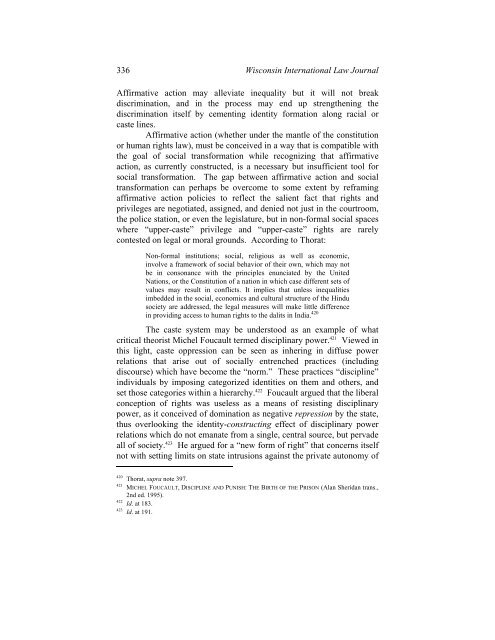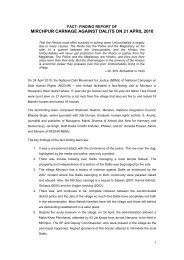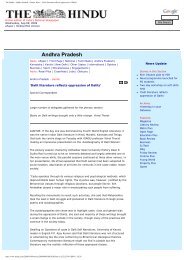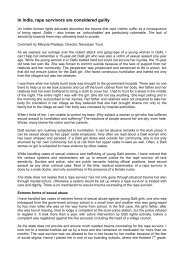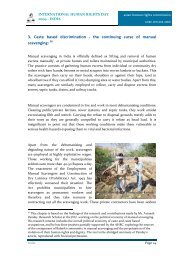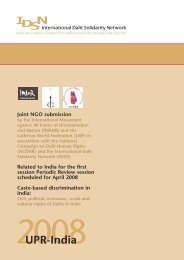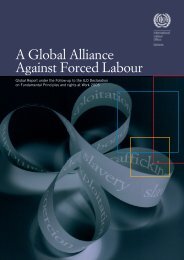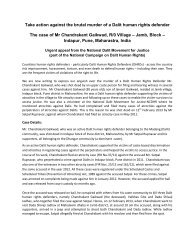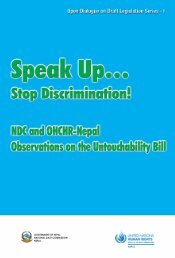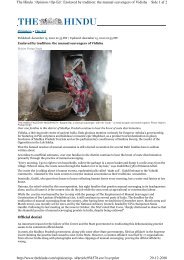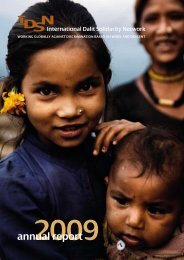equal by law, unequal by caste - International Dalit Solidarity Network
equal by law, unequal by caste - International Dalit Solidarity Network
equal by law, unequal by caste - International Dalit Solidarity Network
Create successful ePaper yourself
Turn your PDF publications into a flip-book with our unique Google optimized e-Paper software.
336 Wisconsin <strong>International</strong> Law JournalAffirmative action may alleviate in<strong>equal</strong>ity but it will not breakdiscrimination, and in the process may end up strengthening thediscrimination itself <strong>by</strong> cementing identity formation along racial or<strong>caste</strong> lines.Affirmative action (whether under the mantle of the constitutionor human rights <strong>law</strong>), must be conceived in a way that is compatible withthe goal of social transformation while recognizing that affirmativeaction, as currently constructed, is a necessary but insufficient tool forsocial transformation. The gap between affirmative action and socialtransformation can perhaps be overcome to some extent <strong>by</strong> reframingaffirmative action policies to reflect the salient fact that rights andprivileges are negotiated, assigned, and denied not just in the courtroom,the police station, or even the legislature, but in non-formal social spaceswhere “upper-<strong>caste</strong>” privilege and “upper-<strong>caste</strong>” rights are rarelycontested on legal or moral grounds. According to Thorat:Non-formal institutions; social, religious as well as economic,involve a framework of social behavior of their own, which may notbe in consonance with the principles enunciated <strong>by</strong> the UnitedNations, or the Constitution of a nation in which case different sets ofvalues may result in conflicts. It implies that unless in<strong>equal</strong>itiesimbedded in the social, economics and cultural structure of the Hindusociety are addressed, the legal measures will make little differencein providing access to human rights to the dalits in India. 420The <strong>caste</strong> system may be understood as an example of whatcritical theorist Michel Foucault termed disciplinary power. 421 Viewed inthis light, <strong>caste</strong> oppression can be seen as inhering in diffuse powerrelations that arise out of socially entrenched practices (includingdiscourse) which have become the “norm.” These practices “discipline”individuals <strong>by</strong> imposing categorized identities on them and others, andset those categories within a hierarchy. 422 Foucault argued that the liberalconception of rights was useless as a means of resisting disciplinarypower, as it conceived of domination as negative repression <strong>by</strong> the state,thus overlooking the identity-constructing effect of disciplinary powerrelations which do not emanate from a single, central source, but pervadeall of society. 423 He argued for a “new form of right” that concerns itselfnot with setting limits on state intrusions against the private autonomy of420 Thorat, supra note 397.421 MICHEL FOUCAULT, DISCIPLINE AND PUNISH: THE BIRTH OF THE PRISON (Alan Sheridan trans.,2nd ed. 1995).422 Id. at 183.423 Id. at 191.


